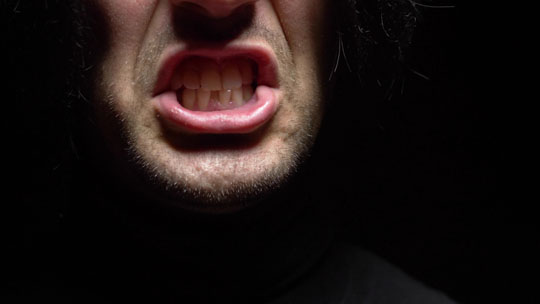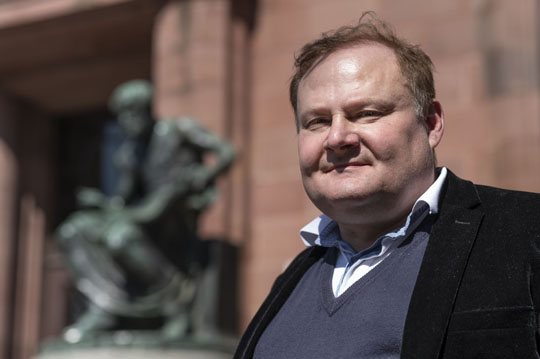Political Pitch
Freiburg, Apr 29, 2020
Vladimir Putin favors visual displays of power – often he’s shown bare chested as a fit, macho warrior – or at least that’s how the Russian president appears in media photographs. But is there a corresponding acoustical demonstration of power and dominance? A University of Freiburg historian and communication specialist, Dr. Dmitri Zakharine, listens closely to how the powerful choose to speak when executing their office. In an interview with Jürgen Reuß, Zakharine explains why employment agencies are so crazy about sending their customers to speech courses, how Putin’s mafioso speech mannerisms embody the post-Soviet ideal of Russia as a nation-state, and why Angela Merkel uses motherly tones to appeal to the EU as a family of nations.
 Aggressive rhetoric and “basta” airs and graces: Gerhard Schröder and Vladimir Putin are kindred spirits when it comes to their manners of speech. Photo: kopitinphoto/stock.adobe.com
Aggressive rhetoric and “basta” airs and graces: Gerhard Schröder and Vladimir Putin are kindred spirits when it comes to their manners of speech. Photo: kopitinphoto/stock.adobe.com
Mr. Zakharine, how did you arrive at the idea of examining how Putin speaks?
Dmitri Zakharine: The voice is a universal identifier. It reveals the background, age, gender, and emotions of the speaker as well. That plays a major role in politics.
So you look more at the actual acoustics, the sound of a speech, than its content?
The content is considered too, of course. But what I’m actually looking at is the tone, in particular, intonation, and the acoustics and linguistic aspects. In practice, these qualities actually say far more than content.
Do you know Professor Henry Higgins from the musical “My Fair Lady?”
Of course.
And do you believe, like Higgins, that a person defines themselves above all through their speech?
Today, speech training, including getting rid of a dialect, is an essential part of retraining programs. Someone worked making dentures. Then they lost their job, took a speech training course, and now earn twice as much money selling false teeth. That’s the idea behind employment agencies. At least sixty percent of their offering consists of speech training.
So you could actually make another Margaret Thatcher out of a flower girl like Eliza Doolittle?
Margaret Thatcher actually worked long and hard to develop her speech in order not to sound like Eliza Doolittle. I’m thinking of a famous quote: “But it is not asking the Community for money; it is asking the Community to have our own money back.” The low base frequency and inflection at the end of the sentence that Thatcher has left in our acoustic memory are the result of this training. But that’s not what I do. I look at what an intonation or inflection like this puts across.
What Charlie Chaplin presents in his onomatopoeic speech as the “Great Dictator?”
That’s a good example. The Nazis spoke very emotionally. The state of technology back then meant that they relied on speech techniques that differ greatly from Thatcher or Putin. In those days, microphones were not as sensitive as they are now, so much more emphasis was placed on pitch. Consonants were poorly received at a distance. That’s why in that era, practiced speakers immediately went higher, into the overtone range of 5,000 Hertz to 8,000 Hertz, and made sure to stretch their vowels. That’s very different from Putin, who is pursuing a similar project to assert a nation-state. His voice varies greatly from the voices of National Socialist orators such as Joseph Goebbels or Adolf Hitler. What stands out with Putin are the frequent use of plosive consonants, like “p,” and extremely stretched consonants. His speech writers ensure these are used more frequently. Putin is the first national leader in the post-Soviet realm who is exploiting the pitch of his voice.
Could you explain in a bit more detail?
After 1991, new speakers were needed as the Russian state reinvented itself. Boris Yeltsin was still shackled to the tradition of the old Soviet Union, while Putin embodies the new, nation-state project. Compared to Mikhail Gorbachev or Nikita Khrushchev, he speaks very quietly, in a very narrow range from 80 Hertz to 170 Hertz, to emphasize that he never loses his composure. He comes from the KGB, the state security service, where you didn’t need to say much. His judo coach – a known criminal who did several prison terms – was important for his career. This is the environment in which Putin grew up. When he became Yeltsin’s successor in 2001, all those aspects influenced the way he developed his speech. The aim was to meet the expectations of his listeners and project a somewhat irritable, contentious tone.
 Background, age, gender, emotions – Dmitri Zakharine emphasizes that the voice can reveal a great deal about people. Photo: Patrick Seeger
Background, age, gender, emotions – Dmitri Zakharine emphasizes that the voice can reveal a great deal about people. Photo: Patrick Seeger
Russia expected back then that the head-of-state would speak like a Mafia don?
You’re right on target with that. The country was in shreds. Bodies were the only thing left to sell on the market. In the 1990s, there was a massive increase in prostitution, and for men, growth in providing security. Semi-criminal young men were recruited for the jobs. Every third man worked in security and still does. These are the people who laundered all the money. It’s no secret.
The state was structured like a criminal organization, and so its leader had to project a corresponding image?
Exactly. The state was organized that way, and it still is to some extent. Patron saints – protectors, such as the police and state security services, still have their hands on the controls. Putin meets the expectations of that clientele with the way he speaks.
Is Putin’s image also reflected back as a role model for society?
Part of my research is dedicated to finding out what proportion of the elites are trying to emulate him. Among those who do are former premier Dmitri Medvedev and his successor, Mikhail Mishustin. Half of the government orients itself to the way Putin speaks – flatly matter-of-fact, with truncated vowels, stretched consonants, and the intonation at the end of the sentence. It’s a kind of style that says “basta” – enough: “I said it, so that’s how it is.”
How would you, on the other hand, describe Angela Merkel’s manner of speaking?
Germany is no longer a nation-state project. That’s why Merkel applies a completely different pitch. The European community of nations, the EU, presents itself more and more as a family group. Aggressive rhetoric no longer reflects the “zeitgeist” in Germany.
Did Merkel also have to practice her speech?
With politicians, it’s almost always trained. The pronunciation comes from the expectations of the listeners. She no longer represents Germans only. Like the Queen, she represents many peoples. Different intonations arise from that. On the one hand, her pitch is low, like many women leaders. Nevertheless, on the other, the way she stretches vowels is almost a familial intonation. There’s something aspirated, as if the air is just whisking past her vocal cords. This emphasizes the motherly aspect.
Gerhard Schröder’s “basta” affectations were something completely different. Were they closer in manner to Putin?
Without a doubt they’re somehow kindred spirits, and not just in the way they speak. Schröder styled himself as a man of action, too, the “Genosse der Bosse” – or something of a “Comrade of the Bosses.” Putin does the same. And we know where Gerhard Schröder is sitting now.
So in terms of speech, Schröder and Putin are like two old-school mafia dons?
Exactly. Ultimately, that cost Schröder popularity. Friedrich Merz is trying this manner of speech right now. But he’s not coming across. Not because of what he’s saying, but how he’s saying it.
How will the next chancellor of Germany speak?
I’m no oracle, but I’d be inclined to say it will be more of a soothing style, like Merkel’s, but someone younger, perhaps like Sebastian Kurz.

